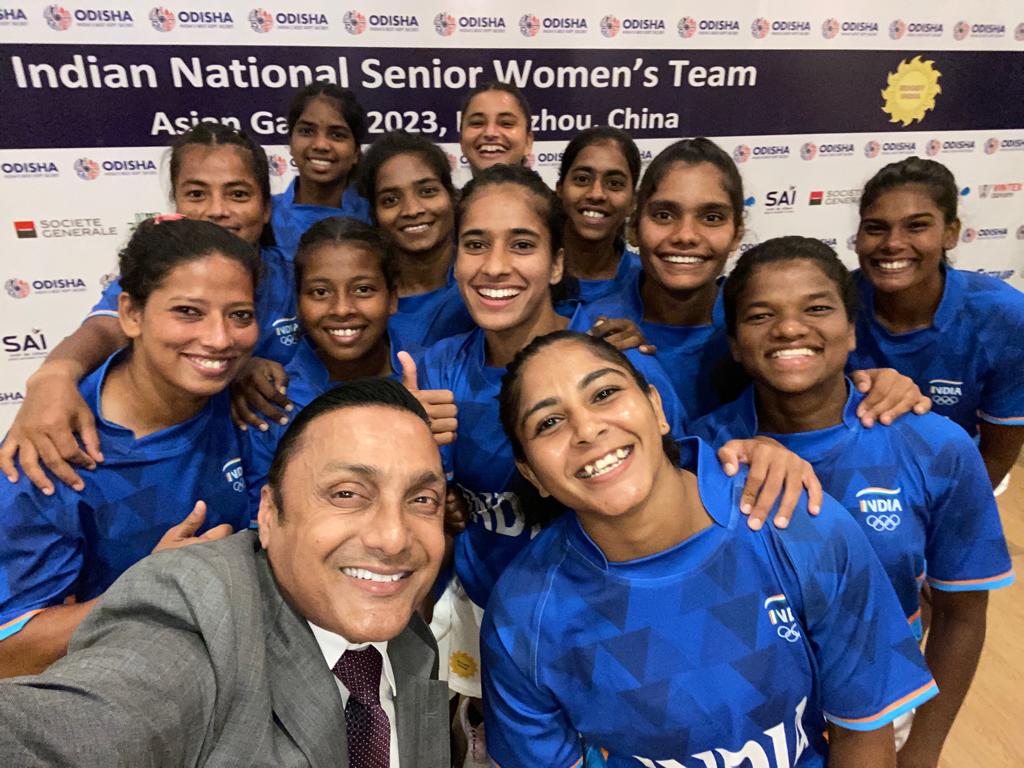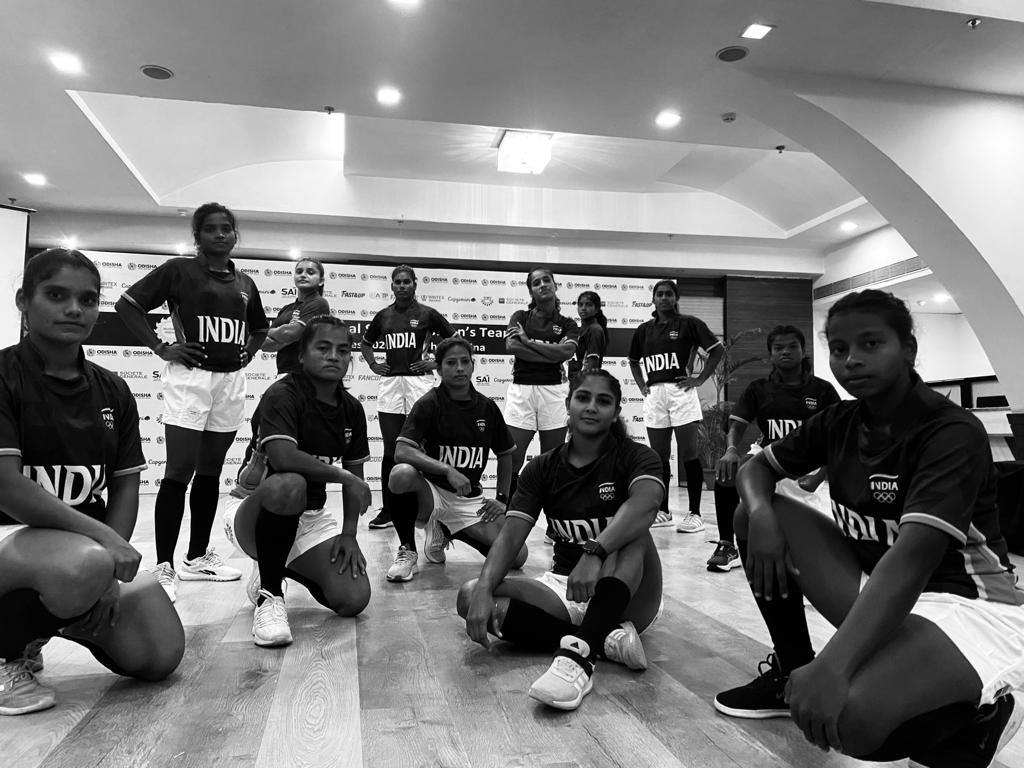It was 552am in the morning and the sun was already out in Kolkata. That’s when Akshay, who heads marketing for Rugby India, called saying he was waiting at the main gate of the SAI Center within the Vivekananda Yuva Bharati Krirangan complex in Kolkata.
It was a special invite from Rahul Bose, President of Rugby India, to watch the Indian team train just ahead of the Asian Games.
Unlike what I had seen a year earlier, the girls are no longer just 5 feet. A number of them seemed taller and heavier and some of them are now 5 feet 6 or 7.
While I had reached at sharp 6, Rahul arrived at about 630am and gave me an initial introduction.
Just as he was speaking, Hupi Majhi, one of the seniors in the team, performed a fitness drill to perfection. As Coach Ludwiche Van Deventer shouted out praise and performance analyst Rasta mentioned how she has continued to improve in the last few months, Rahul started to tell me her story.
“Would you believe it that none in her village knew she played Rugby till 2017. This is because her parents were seriously against her playing and in a conservative village where no woman is allowed to wear shorts, playing Rugby was a far cry. She decided not to tell anyone and just pursued her passion”, he said with a wry smile.
Hupi is a lean and strong girl and has a poise about herself.
“I was a very shy girl and did not really know how to speak or interact with people. When I was sent to boarding school in Bhubaneshwar in 2007, I was scared. I did not want to expose my weaknesses. That’s why in my initial days I did not attend too many classes. In the school mess it often happened that I did not ask for food because I couldn’t speak. So I went hungry”, she said.
By that time, I was all ears and just waited for her to continue.
“It was only after I joined KISS, Kalinga Institute of Social Sciences, the world’s first and only tribal university, that I heard of Rugby. It seemed something I could do well in and something where I could be my own self. I don’t need to speak much when playing. Shouting out instructions yes but all that came much later. I started playing Rugby because it allowed me to do something without having to speak much”, argued Hupi.
So did you tell your parents about your new passion?, I asked.
“I did but they were not willing to let me play. In our village women aren’t allowed to play any form of outdoor sport. Growing up in Dhatika, north of Kendujhar, I was only allowed to go to school as a kind of outdoor activity. Sport was out of the question. So when I mentioned I wanted to play Rugby, my parents were angry. I decided to keep it a secret and just silently continued to pursue my dream”, she said.
With each sentence, her voice was turning louder.
“There was no risk till I got picked to play for India. Honestly it was a dream come true. Wearing the national jersey and doing what I always wanted to do, get on an airplane and travel the world, it seemed Rugby was giving me things I had never imagined I could lay my hands on. The truth is Rugby has taught me everything”, she stopped for a second.
“The problem arose when we finished runner up in the Asia Rugby Women’s Seven’s tournament in Laos. When we came back to Odisha the local papers published my pictures. That’s when the penny dropped. I went home for a break and my parents were shocked to know that I was a Rugby player. They had seen the pictures and it wasn’t pleasant”, Hupi said.
“What changed everything was the support from the Govt of Odisha. The government had announced a reward of a few lac rupees for each one of us. In our family no one had ever heard of that kind of money. When the money was transferred to our accounts and I handed over the money to my parents, they were stunned. Initially it was a sense of disbelief. How could I earn so much money playing Rugby. It was not something they had ever imagined and all of a sudden things changed”, Hupi was emotional.
What about marriage?, I asked. More so because she is now 28, considered way too old for girls in her village to get married.
“No one now asks me the marriage question. And even if they do, I will say no. I want to play for India for a few more years and there is no question of getting married at the moment.”
As Hupi was telling me her story, Mama Naik, Tarulata Naik and Dumuni Marndi, all part of the Asian Games Rugby Seven’s national team, were intently listening. Each of them, may I say, have similar stories. Dumuni, all but 5 feet, doesn’t even look a Rugby player.
“See for us there is nothing to look forward to in life. Girls in our village all have the same life. While growing it is all about helping the men in the family. And when you are off a certain age, your parents will get you married. Then you have children and do the same that your elders did”, Dumuni said pausing for a water break.
“In all this the one thing missing is RESPECT. Girls don’t have respect. That’s what I wanted to earn for myself and that’s what Rugby has given us. That’s why I want to be on the pitch for India. I am happy to get injured. It is my will and my life”, she concluded.
Clearly a rebel was speaking out.
Mama Naik and Tarulata Naik concurred.
“The real change happened when we started getting paid. Everyone wants a better life and there is no harm in that. You want to eat one extra egg if you want to. Have an extra glass of milk or have one extra piece of fish. For years we did not have the means to do this. Each time I wanted to have an extra roti I would have to think that my mother could go hungry if I did so. Now things have changed. Now I can provide my family with a better life and most importantly no one stops me from playing Rugby anymore”, she was emotional.
With Rugby India getting reasonable support from the Government of Odisha and with a proactive President like Rahul Bose at the helm, things can only get better for Indian Rugby in the future. Hupi Majhi, Mama Naik, Dumuni Marndi and Tarulata Naik will no longer be aberrations going forward. Rather, they are now the benchmark with many looking at them as role models and success stories, who have all proved that “dreams do come true.”





